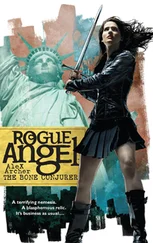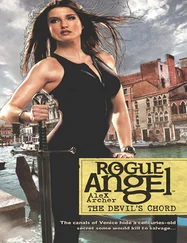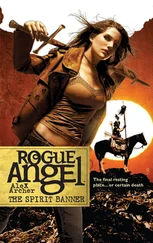Rogue Angel ™
Secret of The Slaves
Alex Archer
 www.mirabooks.co.uk
www.mirabooks.co.uk
Prologue
Chapter 1
Chapter 2
Chapter 3
Chapter 4
Chapter 5
Chapter 6
Chapter 7
Chapter 8
Chapter 9
Chapter 10
Chapter 11
Chapter 12
Chapter 13
Chapter 14
Chapter 15
Chapter 16
Chapter 17
Chapter 18
Chapter 19
Chapter 20
Chapter 21
Chapter 22
Chapter 23
Chapter 24
Chapter 25
Chapter 26
Chapter 27
Chapter 28
Chapter 29
Chapter 30
Chapter 31
Chapter 32
Chapter 33
Chapter 34
Chapter 35
Epilogue
The Upper Amazon Basin
With a growl of its potent diesel engine, the 124-ton bulldozer rumbled into motion across the clearing. Riding outside the enclosed and air-conditioned cab despite the sweltering wet heat, Henrique da Silva felt the power surge through his legs and spine and exulted. Hanging on with one hand and with the Uzi submachine tipped skyward in the other, he felt filled with power, like a conqueror of old. He could even ignore the seismic jiggle the massive engine’s vibration induced in his substantial belly fat, straining against the already sweat-soaked front of his white shirt.
The workers driving the heavy machinery wore coveralls. The heavily armed mercenary force, riding inside and on top of the armored cars that rolled forward flanking him to either side, wore camouflage. But Silva affected dark trousers, shirt and a tie flung rakishly over his shoulder. He was Amazonas State associate secretary for environmental protection. He had an image to project. While some men in his position were only too willing to tart themselves up in rain-forest-pattern battle dress, Silva preferred to distinguish himself from the men he had hired to protect his workers. They too were mere hirelings. He was the man in charge.
Not that that meant he would willingly relinquish his grasp on his submachine gun.
“Your Excellency.” His assistant’s voice crackled with worry as much as static in Silva’s headset. Silva was hardly an excellency. But he seldom reproved his assistant for using the title. He liked its ring. And once they received the returns for the hardwood from the virgin stand of selva on the clearing’s far side—not to mention certain discreet bounties for dealing with native populations that stood in the way of progress— excellency might apply. He knew a number of enterprises where he could rapidly leverage his newfound wealth.
“Excellency, are you sure this is wise? Many men have been lost in this region.” They had landed from a flotilla of riverboats far up the Amazon Basin, distant from anything either man would recognize as civilization.
“Carelessness, Ilyich,” Silva said. “Augmented by silly superstition. Doubtless some earlier parties got themselves ambushed. But we’re not going to be put off by a handful of naked savages, are we?”
“But there are stories—the hidden city of magicians.”
“Fah. You’re a government employee, Ilyich. An educated young man. Not a stupid and ignorant dockhand in Bahia, ready to scuttle off at the first rumor of Indian witchcraft.”
Silva considered himself above all that. The little deer-hide pouch of chicken bones, tobacco and certain other none-too-clearly specified substances he carried inside his watch pocket was merely a memento.
“I’m concerned for our work schedule,” his assistant said. “And costs. Costs, of course.”
“Then let’s not delay. Soares? Are your men in readiness?”
“Yes.” The work-gang boss rode another huge bulldozer. He most closely resembled a brick, in shape, complexion, and consistency. He was a man of medium height with dark reddish brown skin, a curly fuzz of red hair brushed with yellowish white around the fringes of a dome of skull, even slightly reddish murky eyes. The single affirmative was all Silva needed or expected of him—he spoke about as much as a brick. He allowed no nonsense, which recommended him highly for his task, where neither sloppiness nor malingering could be tolerated.
“And you, Colonel Bruckner?” Silva asked.
The security chief was a real German, not a second-or third-generation Brazilian German from down south. He was a veteran of the former East German National People’s Army and a thoroughly work-hardened mercenary—or private military contractor, as he preferred to be called. He was a short man, precise and slim as an ice pick, with a prematurely white buzz cut and coal-black eyebrows over bright blue eyes.
“Yes,” Bruckner replied. “My men champ at the bit. Let’s go kill some savages.” His notion of how to deal with indigenous peoples accorded well with Silva’s.
“Go,” Silva commanded. With a hand on top of the cab, he waved his Uzi in a rough circle in the air. Few actually saw the gesture; they were either sealed into metal boxes or peering intently at the jungle lying ominously in wait. But it made Silva feel like a conqueror.
The vehicles swept forward. The mercenaries mostly rode in their six-wheeled armored cars, the workers clinging to the bulldozers or banging around like loads of papayas in stake-bed trucks. Silva rode a precarious perch just behind the monstrous, hot engine. But as the machine’s treads bit into the black soil and the great blade began to shove down the tall yellow grass in front, he knew it was worth it.
This land was low but only submerged when the rains caused the great river to rise over its ill-defined banks. The path from their river beachhead led across a wide clearing, with its high grass and anomalous black soil. The rich topsoil was called black Indian earth. Found throughout the Brazilian Amazon, it was supposedly a special soil artificially created by the inhabitants. The undersoil of the Amazon Basin was poor, weak and thin. He believed it had to be some kind of unexplained natural phenomenon. Who could believe ignorant savages could create something modern science was unable to duplicate, and so much of it?
The stink of diesel overpowered even the jungle reek of wet and rotting vegetation. The roar of big engines overpowered everything, enclosing Silva in a microcosm of noise and power. A heavy warm wind blew against Silva’s plump face.
Ahead and to the left, a flight of small blue birds rose from the high grass and swirled up chittering in the air, as into an inverted invisible drain. After a reflexive glance at the sudden movement, matched by a sort of interior jerk, Silva ignored them. He was a progressive, a man of the modern world. As far as he was concerned any bit of nature he couldn’t bend to the use of the state—with a bit of profit on the side for him—was just clutter.
The associate secretary assumed the white smoke that puffed into the heavy air ahead was some kind of primitive signal by the savages to alert their friends and relatives to the mechanized doom rolling toward them. Then a fierce crack stabbed his ears right through the engine’s roar.
The hatches of an armored car just four vehicles to his left flew open. An astonishing quantity of black smoke erupted from them. Men scrambled out, shrieking. They burned with flames that were almost invisible in the bright sunlight.
The associate secretary heard Bruckner curse in his earpiece.
“You said these were just Indians, Silva. Where did they get MILANs?”
Silva was still blinking in amazement at the stricken armored car. It had rolled to a stop. Orange flames jetted from the open hatches. Yellow explosions crashed and flashed through them like fireworks as ammunition belts cooked off inside. The vehicles immediately behind it had stopped, more in response to the sudden attack than any obstacle the wreck posed. The word at the end of the German’s sentence made no sense to Silva.
Читать дальше

 www.mirabooks.co.uk
www.mirabooks.co.uk










